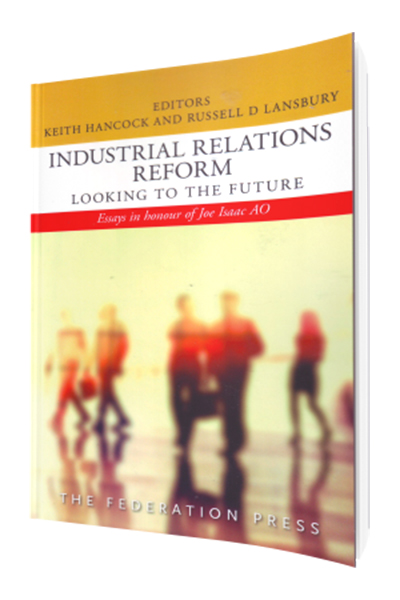Researchers call for sweeping IR reforms
SWEEPING reforms are needed to achieve not only productive workplaces but also a more prosperous and equitable nation, according to researchers for the recently released book, Industrial Relations Reform: Looking to the Future.
Academics from several Australian universities, led by editor-professors Keith Hancock and Russell Lansbury, are calling for greater cooperation between employers and unions, more effective regulation of labour markets, a focus on gender equality and investment in ‘stagnant’ vocational training.
The book includes contributions from the University of Sydney Business School professor Marian Baird, associate professor Rae Cooper and doctor Chris Wright.
Industrial Relations Reform: Looking to the Future: Essays in Honour of Joe Isaac, has been edited by Flinders University’s Emeritus Professor Keith Hancock and the University of Sydney Business School’s Emeritus Professor Russell Lansbury. 
Industrial Relations Reform: Looking to the Future: Essays in Honour of Joe Isaac is dedicated to emeritus professor Joe Isaac, one of Australia’s most distinguished scholars in the industrial relations field, said editors Prof. Hancock of Flinders University and USBS’s Prof. Lansbury.
In the publication, reform advocates list four key changes needed “to achieve not only productive workplaces but also a more prosperous and equitable nation”.
First, they believe “there needs to be a greater commitment by unions and employers to use collective bargaining to achieve positive outcomes”.
“Such bargaining needs to move beyond being ‘adversarial’ in its approach and focusing solely on ‘distributive’ outcomes in order to create more cooperative relationships between the parties in the workplace.”
Moving to wealth distribution, contributors say potential efficiency and macro-economic gains from increased productivity must be distributed more equitably as a means of stemming rising inequality in Australian society”.
In order to achieve this they say “there is a need for more effective regulation of the labour market to establish and enforce rules of fair treatment”.
On paid parental leave, the book calls on the nation to “move beyond the legacy of the male breadwinner paradigm, and develop new policy options in relation to women and work”.
Australia, the book says, still lags behind many other advanced economies in terms of maternal employment rates and that policies have not yet been adopted to meet the growing work and family pressures on women.
The book also turns up the blowtorch on vocational training.
“Reforms to education and training policies since the 1990s have contributed to declining employer and community confidence in the value of vocational qualifications,” the authors claim.
“This has led to diminishing enrolments in many trades-based apprenticeships, stagnation in both public and private investment in vocational skills and the erosion of transferable occupational and industry-specific skills.”
They have called for a great union say in vocational education and training and an improved dialogue between education institutions, employers and workers to develop a modern qualifications system.
“These four key reforms involve more than simply amending labour laws,” the book concludes. “They require social and economic changes which ensure that long-term reforms to industrial relations are achieved which will improve not only greater prosperity but also more equitable outcomes for Australian society.”
ends

 How to resolve AdBlock issue?
How to resolve AdBlock issue?